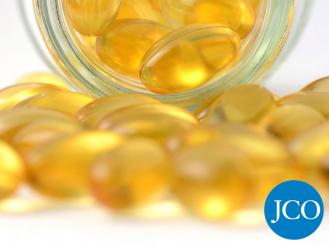Jun 14, 2016
A study in the Journal of Clinical Oncology (JCO) found that among patients with melanoma, lower levels of vitamin D are associated with lower overall survival (OS), lower melanoma specific survival (MSS), and shorter disease-free survival (DFS)—and that these outcomes are independent of systemic inflammatory response, measured by levels of C-reactive protein. The study, “Association of Vitamin D Levels With Melanoma Patient Outcome Following Adjustment for C-Reactive Protein,” was published online ahead of print, March 21.
Jeffrey E. Lee, MD, senior author on the study, explained why the researchers thought it important to find out whether vitamin D is independently associated with melanoma outcomes or dependent on the CRP pathway. CRP is one of a group of proteins that increase in the body when there is inflammation.
“Deficient or low levels of vitamin D have been linked to negative outcomes in a variety of conditions, such as diabetes and heart disease. And we know that vitamin D has a variety of properties that could be beneficial to patients who either have cancer or are at risk for cancer. It’s anti-inflammatory, it has anti-proliferative effects, it impedes tumor growth and invasiveness, and it promotes DNA repair. In melanoma specifically, vitamin D deficiency has been associated with more advanced stage at presentation and thicker melanoma tumors, which are correlated with poorer survival.”
But findings from a study published in JCO in 2015, authored by Lee and many coauthors from the current paper, raised a question about whether vitamin D is by itself an independent marker of melanoma or whether it might be part of another pathway. Specifically, the 2015 study found that higher levels of CRP in patients with melanoma is independently associated with poorer melanoma-specific survival. And since CRP is inversely related to levels of vitamin D—that is, as CRP rises, vitamin D declines, and vice versa—the researchers questioned whether outcomes associated with vitamin D might actually be an effect of corresponding increases and decreases in levels of CRP.
Vitamin D is associated with CRP levels, but is an independent marker of survival outcomes
To find out if vitamin D levels are independently correlated with melanoma outcomes, the researchers analyzed the plasma of 1,042 patients recently diagnosed with melanoma. The plasma was analyzed for vitamin D and CRP levels simultaneously, and patients were followed over a median of 7.1 years to measure OS, MSS, and DFS.
The analysis showed that while CRP levels were significantly associated with vitamin D levels (as one rises, the other declines), vitamin D was independently associated with such outcomes as OS, MSS, and DFS.
Commenting on the findings, Dr. Lee said, “We were able to demonstrate for the first time that low levels of vitamin D were an independent marker of melanoma-related death, and that while vitamin D and CRP were strongly correlated with each other, each was an independent marker of clinical outcome.”
A need for more research into the therapeutic value of Vitamin D in melanoma
According to Dr. Lee, before doctors can recommend that patients who have or have had melanoma increase their vitamin D intake, more research needs to be carried out.
“We don’t yet know whether supplementing vitamin D or intervening to reduce CRP has therapeutic benefit for melanoma patients. The effects of such interventions are controversial and also largely unknown right now. I think it’s reasonable to consider a clinical trial that includes targeted interventions to raise vitamin D or to reduce CRP for patients who have had melanoma, and at the same time to work to develop better pre-clinical models to investigate both of these mechanisms.”
Jeffrey E. Lee, MD, is Department Chair and a Professor in the Department of Surgical Oncology, Division of Surgery, at The University of Texas MD Anderson Cancer Center, in Houston. He is also Co-Director of the Melanoma and Skin Cancer Research Program and Executive Director, in the Division of Surgery, for the Cancer Network at MD Anderson. He has been an ASCO member since 1996.
Abstract of the original JCO article
PDF of the original JCO article
Fang S, Sui D, Wang Y, et al. Association of vitamin D Levels with melanoma patient outcome following adjustment for C-reactive protein. J Clin Oncol. Epub 2016 Marc h 21.
The Exclusive Coverage series on ASCO.org highlights selected research from JCO, JOP, and JGO, with additional perspective provided by the lead or corresponding author.
@ 2016 American Society of Clinical Oncology


